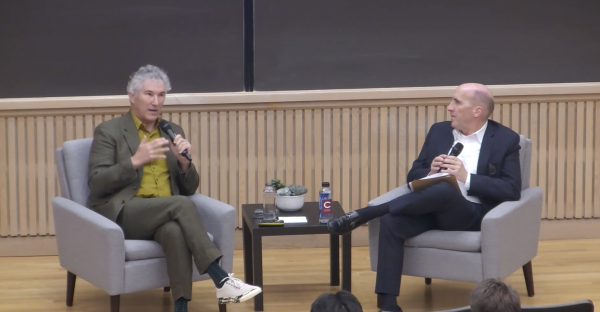Honor Societies Recognize Student Accomplishments
As winter break draws nearer, the application and qualification processes are beginning for Colgate University’s three honor societies: Phi Eta Sigma, Phi Beta Kappa and Konosioni Senior Honor Society.
Eligibility for Phi Eta Sigma is based on grades that a student earns during his or her first year at college. The society was established nationally in 1923 and came to Colgate in 1982.
Those first-years with a GPA of 3.5 or higher at the end of the fall term will receive membership invitations in mid-January, and another round of invitations will be sent out at the end of the spring term.
If these students accept the invitations, they pay the membership fee, have their names registered with the national organization and are inducted during a brief ceremony the following November. This year, the Class of 2008 will induct 140 new members.
According to Dean of First-Year Students Beverly Low, approximately 85 percent of students who are offered membership accept, but far fewer continue to be active members after induction.
“I don’t think it’s widely known,” Low said. “There’s not a lot of follow-through.”
Low said that Phi Eta Sigma is a good introduction to the opportunities available to Colgate students and can help first-year students who are seeking out summer learning experiences. Phi Eta Sigma is also responsible for choosing the Professor of the Year, an honor given at the Awards Convocation each April.
Phi Beta Kappa, a senior honor society, is as old as the United States of America. Faculty members who were elected Phi Beta Kappa in college meet three times a year to consider current seniors who have displayed academic excellence. Overall, an average of five percent of the senior class is chosen every year.
In order to be considered, seniors must have a history of adherence to the Academic Honor Code. There are also specific subject matter requirements in foreign language and in mathematics.
“It’s not just a matter of numbers,” President of Colgate’s Phi Beta Kappa chapter, Charles A. Dana Professor of Mathematics Dan Saracino said. “We also look at the breadth and depth of courses taken.”
Saracino said that Phi Beta Kappa is probably the only honor society that can be found in American literature and the dictionary, as well as in the Colgate student handbook.
“The requirements are right there,” he said. “I guess people don’t read it. I wish people were more aware of it, because we can certainly elect more than five percent of our class. It would be terrific if more people achieved it.”
Konosioni is another senior honor society but, unlike Phi Beta Kappa, it is specific to Colgate and is peer-selected. Founded from the union of two secret societies, the organization is based on dedication to service, academia and Colgate tradition. The society was named after a peace conference between the Mohawk and Onondoga nations.
Konosioni’s 26 members (traditionally, 13 men and 13 women) hold many events each year, but three remain standard: the convocation ceremony for first-year students, the first-year field day and the springtime auction.
Each new group of honorees is responsible for creating its own mission statement and set of goals.
In early to mid-November, juniors will receive an e-mail informing them of “coffee hours,” or times when interested students can meet with current Konosioni members at The Barge Canal Coffee Co. in Hamilton. Juniors then submit their application by mid-January.
Konosioni members review these anonymous applications both individually and at group meetings and select the 26 best candidates based on academics, leadership and diversity of motivations.
“We all have different leadership experiences,” senior President of Konosioni Mary Acoymo said. “The reason it looks good [to employers] is that it’s a group of leaders. It’s just like the real world, in a business world where everyone is used to being in charge.”




